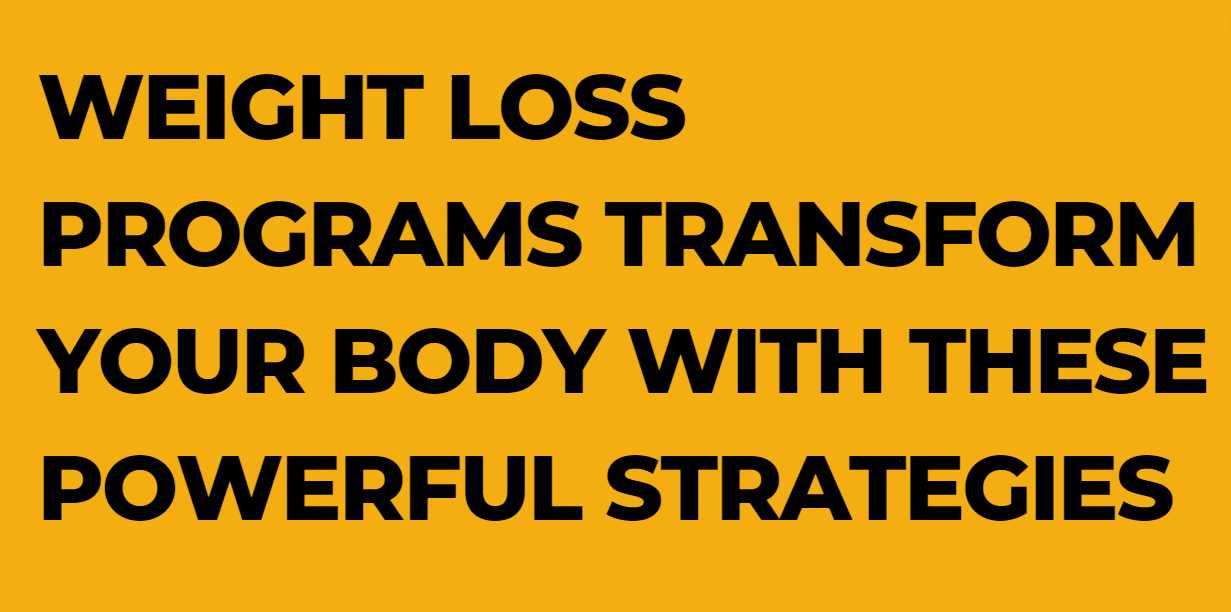Weight Loss Programs Transform Your Body with These Powerful Strategies

Weight loss programs help individuals achieve their desired weight through structured plans that include diet, exercise, and lifestyle changes. These programs provide guidance and support to individuals in their weight loss journey, helping them adopt healthier habits and reach their goals.
With a focus on nutrition, physical activity, and behavior modification, weight loss programs offer personalized strategies and tools for sustainable weight loss. By implementing proven techniques and professional guidance, these programs empower individuals to make positive changes and maintain a healthy weight long-term.
A variety of weight loss programs are available, catering to different preferences and needs, making it easier for individuals to find a program that suits their lifestyle and goals.
Weight Loss Programs: Your Transformation Journey
Embarking on a weight loss journey can be overwhelming, but understanding the basics is key to achieving success. Weight loss is a result of creating a calorie deficit, where you consume fewer calories than you burn. Diet is a critical factor, where you choose nutrient-dense foods and control portion sizes. Combined with exercise, weight loss programs aim to improve overall health and burn fat.
Setting realistic and achievable weight loss goals is crucial for long-term success. When setting goals, it’s important to be specific and measurable. Instead of saying “I want to lose weight,” set a goal like “I want to lose 10 pounds in three months.” This allows you to track your progress and stay motivated. Additionally, it’s essential to set realistic time frames and be patient, as healthy weight loss is gradual and sustainable.
There is no one-size-fits-all approach to weight loss. Every individual has unique needs, preferences, and challenges. A personalized weight loss program takes into account your lifestyle, dietary restrictions, and fitness level. It focuses on creating a plan that suits your specific circumstances, making it more effective and sustainable. Personalization also encourages accountability and allows for adjustments as needed, ensuring long-term success and satisfaction.
Choosing The Right Program
When embarking on a weight loss journey, it is important to consider the role of diet in achieving your goals. A well-balanced and nutritious diet is key to fueling your body and supporting weight loss. Focus on consuming fresh, whole foods that are rich in vitamins, minerals, and fiber. Incorporate lean proteins, fruits, vegetables, and whole grains into your meals. Stay hydrated and limit processed foods, sugary drinks, and unhealthy snacks.
Exercise plays an essential role in weight loss programs. It helps burn calories, increase metabolism, and build muscle mass. To achieve optimal results, combine cardiovascular exercises with strength training. Cardiovascular exercises such as running, cycling, or swimming are ideal for burning calories and improving cardiovascular health.
Strength training exercises like weightlifting or bodyweight exercises help build muscle and boost metabolism. Strive for a balanced exercise routine that includes both types of exercises to maximize weight loss and improve overall fitness.
When it comes to weight loss, finding the right balance between cardio and strength training is crucial. Cardio exercises enhance calorie burning and improve cardiovascular health, while strength training helps build lean muscle mass and increase metabolism. Aim for a combination of both types of exercises, alternating between cardio and strength training sessions throughout the week. Gradually increase the intensity and duration of your workouts to challenge your body and continue making progress. Remember to listen to your body, rest when needed, and consult a fitness professional for personalized guidance.
Transform Your Body With Scientific Methods
Weight loss programs can be highly effective in transforming your body when following scientific methods. One important factor to consider is the impact of metabolism on weight loss. Metabolism plays a crucial role in determining how efficiently your body burns calories. By incorporating techniques like intermittent fasting, you can optimize your metabolism to aid weight loss.
Intermittent fasting involves cycling between periods of fasting and eating. This approach has shown promising results in promoting weight loss and improving overall health. Another game-changing method is the ketogenic diet. This low-carb, high-fat diet helps induce a metabolic state called ketosis, which can lead to rapid and sustained weight loss.
By limiting your carbohydrate intake and increasing healthy fats, the ketogenic diet encourages your body to burn stored fat for energy. These scientifically backed strategies can provide effective results in your weight loss journey, helping you achieve the body transformation you desire.
Wellness Coaching Unlock Your Potential
Behavioral Changes For Lasting Results
When it comes to weight loss programs, incorporating mindfulness into eating habits can be a powerful tool. Mindful eating involves paying attention to the sensations and emotions that arise during a meal, enabling individuals to make healthier, more satisfying food choices. Mindfulness can also promote portion control and reduce the likelihood of emotional eating.
Another crucial element in successful weight loss programs is the establishment of consistent sleep patterns. Research has shown that poor sleep can disrupt hormone regulation, increase hunger, and lead to weight gain. By prioritizing sleep and maintaining a regular sleep schedule, individuals can support their weight loss efforts.
In addition to mindfulness and sleep, stress management is key to achieving lasting results. Chronic stress can trigger emotional eating and sabotage weight loss progress. Incorporating stress management techniques such as exercise, meditation, and deep breathing can improve outcomes and reduce the likelihood of weight regain.
Tracking Progress And Adjusting Strategies
Tracking your progress is an essential step in achieving your weight loss goals. Using fitness apps and wearables can be an effective way to monitor your daily activity levels, calories burned, and even your sleep patterns. These tools can provide valuable insights into your overall health and help you stay on track with your weight loss program.
Another helpful strategy is to join a weight loss support group. These groups can provide a sense of community, accountability, and encouragement. Sharing your progress, challenges, and successes with others who are on a similar journey can be incredibly motivating.
It’s important to also know when to revise your weight loss program. If you’re not seeing the results you want or if you’ve hit a plateau, it may be time to reassess your strategies. Consider consulting with a healthcare professional or a nutritionist who can provide guidance and help you make necessary adjustments to your diet, exercise routine, or overall approach.
Combining Supplements With Weight Loss Programs
Combining supplements with weight loss programs can be an effective strategy to achieve your weight loss goals. One important aspect to consider is the role of dietary supplements in this process. These supplements can provide additional support to your weight loss efforts by increasing metabolism, reducing appetite, or promoting fat burning.
It’s crucial to understand the pros and cons of popular supplements before incorporating them into your weight loss program. Some commonly used supplements include green tea extract, Garcinia cambogia, and CLA. While these supplements may offer benefits such as increased energy and enhanced fat metabolism, they can also have potential side effects and may not work for everyone.
When using dietary supplements, it’s important to prioritize safety. Make sure to consult with a healthcare professional or a registered dietitian before starting any supplement.
They can provide guidance on appropriate dosage, potential interactions with medications, and any potential risks. Additionally, always purchase supplements from reputable sources to ensure quality and safety.
| Supplement | Pros | Cons |
|---|---|---|
| Green tea extract | – Increased metabolism – Antioxidant properties |
– Caffeine sensitivity – Digestive upset |
| Garcinia cambogia | – Reduced appetite – Inhibit fat production |
– Potential liver damage – Digestive issues |
| CLA | – Increased fat burning – Preserves lean muscle mass |
– Digestive issues – Potential nutrient deficiencies |
In conclusion, understanding the role of dietary supplements and considering their pros and cons, along with prioritizing safety, can help you make informed decisions when combining them with your weight loss program. Remember to consult professionals and practice caution when incorporating supplements into your weight loss journey.
Expert Tips For Weight Loss Success
Weight loss programs can be challenging, but with the right advice from experts, you can achieve success. Nutritionists and fitness trainers have shared valuable tips that can make a difference in your weight loss journey.
Motivational strategies are essential to keep you going. Setting realistic goals, rewarding yourself, and finding a supportive community can help you stay motivated throughout the process. Remember, consistency is key.
Avoiding common pitfalls is crucial for weight loss success. One common mistake is relying on fad diets that promise quick results. Instead, focus on making sustainable lifestyle changes, such as incorporating a balanced diet and regular exercise into your routine.
Another pitfall is not addressing emotional eating. Stress and emotions can often lead to unhealthy eating habits. Finding alternative ways to manage stress, seeking professional help if needed, and practicing mindful eating can help overcome this challenge.
With the right guidance and strategies, you can achieve your weight loss goals and maintain a healthy lifestyle in the long run.
Frequently Asked Questions On Weight Loss Programs
How Do Weight Loss Programs Work?
Weight loss programs typically combine a healthy diet plan with regular exercise to help individuals lose weight. These programs often provide personalized meal plans, guidance on portion control, and support in setting and achieving fitness goals. They can be designed for different dietary preferences and may also involve behavior modification techniques to promote long-term weight management.
Are Weight Loss Programs Effective?
Weight loss programs can be effective for many individuals, but success may vary depending on factors such as adherence to the program, individual metabolism, and overall commitment to lifestyle changes. It’s important to choose a program that suits your needs, provides professional guidance, and promotes a sustainable approach to weight loss for better chances of success.
Are Weight Loss Programs Suitable For Everyone?
Weight loss programs can be beneficial for most individuals, but it’s essential to consider your individual health and any specific dietary requirements. Consulting with a healthcare professional before starting any weight loss program can help ensure it is safe and appropriate for you.
They can provide guidance tailored to your specific health goals and needs.
Conclusion
Weight loss programs are an effective way to achieve your fitness goals. With a wide variety of options available, finding the right program can be overwhelming. However, by considering factors such as personal preferences, lifestyle, and professional guidance, you can select a program that is tailored to your needs.
Remember, it’s important to focus on sustainable habits and consistency to maintain long-term results. So, embark on your weight loss journey with confidence and dedication, and witness the positive changes in your health and well-being.




